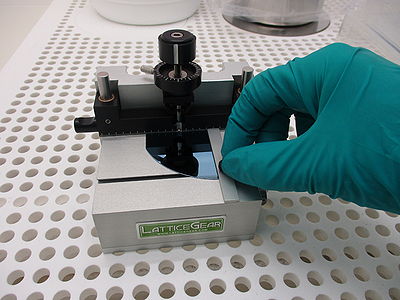Specific Process Knowledge/Back-end processing/LatticeAxe: Difference between revisions
No edit summary |
|||
| (One intermediate revision by one other user not shown) | |||
| Line 2: | Line 2: | ||
'''Unless anything else is stated, everything on this page, text and pictures are made by DTU Nanolab.''' | '''Unless anything else is stated, everything on this page, text and pictures are made by DTU Nanolab.''' | ||
== The Cleaver: LatticeAxe == | |||
The Cleaver: LatticeAxe is designed for cleaving wafers into smaller pieces without leaving any particles on the sample. It works by making a small mark in the side of the sample that is then used as a start point for the cleaving. | The Cleaver: LatticeAxe is designed for cleaving wafers into smaller pieces without leaving any particles on the sample. It works by making a small mark in the side of the sample that is then used as a start point for the cleaving. | ||
The equipment is placed in the left drawer underneath | The equipment is placed in the left drawer underneath fume hood 5: Special purposes. When operated the the Cleaver: lattice axe should always be placed inside Fume hood 5. | ||
[[File:LatticeAxe placer prøve.JPG|400px]] | [[File:LatticeAxe placer prøve.JPG|400px]] | ||
Latest revision as of 10:49, 30 September 2025
Feedback to this page: click here
Unless anything else is stated, everything on this page, text and pictures are made by DTU Nanolab.
The Cleaver: LatticeAxe
The Cleaver: LatticeAxe is designed for cleaving wafers into smaller pieces without leaving any particles on the sample. It works by making a small mark in the side of the sample that is then used as a start point for the cleaving.
The equipment is placed in the left drawer underneath fume hood 5: Special purposes. When operated the the Cleaver: lattice axe should always be placed inside Fume hood 5.
Approved Materials:
- Si
- Quartz
- Pyrex (Borofloat 33)
- GaAs
- InP
- Sapphire
The LatticeAxe can cleave samples from 100mm down to 10mm. In some cases it can even be used on larger samples please contact wetchemistry group for more information
DTU-Nanolab has 3 different types of Cleavers see the Labadviser pages for the FlexScribe and the FlipScribe for more information.

